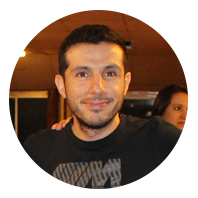
Gassan Quintar tells us about meditation and how it affects his life
How did you start to take an interest in meditation? How long have you been practicing?
Initially, I was interested in yoga, but I had never made the effort to start. Although it was not on my radar, the word ‘meditation’ appeared on an email invitation from our coworking offices, which said something like “Sessions are intended for all people who wish to take first steps toward meditation.” I thought this was interesting, though not enough.
A friend recommended both the class and the instructor to me, and convinced me to try it by saying wonderful things about this practice. In the end, I decided to go for it.
The email invitation asked the people interested in joining the class to write the reason why they were interested. My motivation was to get into this practice, to learn more about it..
I only needed the first class to know that meditating was exactly what I was looking for, and that through it I was going to gain multiple benefits. Since that time, four months have passed and I still practice it every week.
People often don’t understand what meditation is. Some might think that it’s sitting in a quiet space and falling asleep. What is meditation for you?
People often associate the word “meditation” with thinking or reflecting deeply on a certain topic. For example: “I recommend that you meditate on the topics we were talking about,” etc. In fact, it is much deeper than just thinking. It’s concentration.
From the point of view of my current practice, it is to focus your attention on the breathing in a conscious way. Through various breathing techniques, you train your mind to reach complete concentration. As you do this, other distracting thoughts get removed from the mind.
What is needed to meditate?
It requires several things – from a yoga mat to a good teacher – to guide you in practice. But the main thing is the willingness to want and believe in what meditation offers. You shouldn’t want to do it just because it’s “trendy” without understanding the main concept behind the practice.
Some time ago, my teacher, gave us a guide so we could try practicing at home. It consists of 3 steps:
- Motivation: Think about why you are meditating. That includes ourselves as individuals and our environment.
- The technique of meditation.
- Acknowledgment: Being thankful for what allows us to be present, to be part of the experience, and for all that we achieve.
This is a guide not only applies to meditation, but to life itself.
How has meditation benefitted other aspects of your life?
There are multiple benefits. They impact every aspect of our lives – not just ourselves as meditators, but also the people around us.
Meditation develops several virtues, such as the ability to concentrate, patience, discipline, compassion, forgiveness, and love among others.
What tips would you give to someone who has tried meditation but never felt like they have achieved a state of true meditation?
Being ‘in a state of meditation’ comes in different forms that we know how to identify with the help of a good instructor. It’s worth mentioning that we should not go into meditation practice in a state of anxiety, but that we should go with a mindset of perseverance and discipline for the training so that we may develop our minds and the skills we need. It is daily practice and a great instructor that will help you achieve the proper ‘state.’


